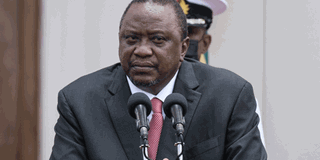
In this file photo taken on February 18, 2022 Kenya's President Uhuru Kenyatta gives a statement on the coronavirus disease (COVID-19) vaccination on the second day of a European Union (EU) African Union (AU) summit at The European Council Building in Brussels. PHOTO/AFP
|Uhuru Kenyatta: Millionaire heir and inscrutable president
What you need to know:
- Born to Jomo and his fourth wife "Mama" Ngina in October 1961, Uhuru (which means "freedom" in Swahili) studied in the United States and entered politics in the mid-1990s.
Puppet or strategist, dilettante or power-hungry heir? After nearly 10 years in power and a mixed legacy, Uhuru Muigai Kenyatta remains an enigma to many Kenyans, even to those who twice elected him president.
But one thing is certain: it is impossible to disassociate the outgoing leader from his family, which ranks among Kenya's richest, with two of Kenya's four presidents emerging from the Kenyatta dynasty.
His endorsement of longtime arch-rival Raila Odinga sparked rumours that he wants to play kingmaker, helping the veteran opposition leader secure the backing of his ruling Jubilee party.
True to form, Kenyatta's motives or future plans remain unclear but many believe he will build on the diplomatic legacy crafted since his re-election in 2017.
The 60-year-old has worked hard to raise Kenya's international stature and fashioned himself as a regional statesman, seeking to resolve conflicts in Ethiopia and the Democratic Republic of Congo.
He also strengthened the country's status as an East African economic powerhouse, launching several major infrastructure projects including a Nairobi expressway inaugurated last month that has also caused Kenya's debt to balloon.
His avowed fight against corruption has been less successful, prompting bemusement and even ridicule among Kenyans who have long seen the Kenyatta family as the embodiment of the elite stranglehold on power.
His father Jomo served as independent Kenya's first president and the family is the country's largest landowner, with a financial empire that includes dairy giant Brookside, the NCBA bank and television broadcaster Mediamax.
His own fortune was estimated at $500 million by Forbes in 2011.
Political alliances
Born to Jomo and his fourth wife "Mama" Ngina in October 1961, Uhuru (which means "freedom" in Swahili) studied in the United States and entered politics in the mid-1990s.
Over the years "the prince of Kenyan politics" has allied himself with leaders across the spectrum, from the autocrat Daniel arap Moi -- an early mentor -- to former president Mwai Kibaki, who he backed in the 2007 election.
The disputed vote led to an eruption of politically-motivated tribal violence largely involving two of Kenya's main ethnic groups, the Kikuyu and the Kalenjin, that saw more than 1,100 people killed.
In 2013, Kenyatta -- a Kikuyu -- allied with William Ruto, a Kalenjin, and was elected president.

In this file photo taken on March 09, 2022 Kenya's President Uhuru Kenyatta looks on during Zimbabwe's President Emmerson Mnangagwa speech at the State House in Nairobi. PHOTO/AFP
Both were indicted by the International Criminal Court for their role in the 2007-2008 killings but the cases eventually collapsed, with the prosecution saying a relentless campaign of witness intimidation made a trial impossible.
Kenyatta's re-election bid in 2017 plunged the country into turmoil, as police cracked down on opposition protests to deadly effect.
His victory was annulled by the Supreme Court, but he won a re-run after his then opponent Odinga boycotted the process, calling the vote rigged.
Then, in a turn of events few saw coming, the two men stunned the nation in March 2018 by shaking hands and declaring a truce.
The pact -- known simply as "the handshake" -- consigned Ruto to the sidelines.
But Kenyatta's pet political project, the Building Bridges Initiative (BBI) which aimed to expand the executive, hit a roadblock after the Supreme Court ruled it illegal.
Many saw the constitutional proposals, which included the creation of a new prime minister post allegedly earmarked for Kenyatta, as a final bid to stay in power after his second and last term as president.
'Party animal'
Kenya's global profile rose under his watch, as he welcomed foreign investors and a succession of visiting international dignitaries including former US president Barack Obama and Pope Francis.
Despite his long career, the father-of-three remains a mystery to many.
Some diplomatic sources characterise him as "a party animal who didn't want the job" while others describe him as an astute politician with a common touch "who knows how to talk to people".
A regular churchgoer, he easily mixes with ordinary Kenyans, eagerly gets down on the dance floor and joshes in the local youth slang.
His shy brother Muhoho manages the family finances, while he reportedly enjoys driving around Nairobi late at night, incognito and protected by a handful of bodyguards.
As his final term winds down, Kenyatta looms over Tuesday's election, with Ruto devoting much of his time to campaigning against his former boss instead of Odinga.
Although many Kenyans expect Kenyatta to keep his hand in the game, the man himself has dismissed the speculation, telling broadcaster France 24 last year: "Oh, please, please! I would rather enjoy a holiday in France each summer."
"I don't want to remain in power as they allege. This is a difficult job," he told a prayer service last month.
"Ten years for me is enough. I am waiting for 9th August."





